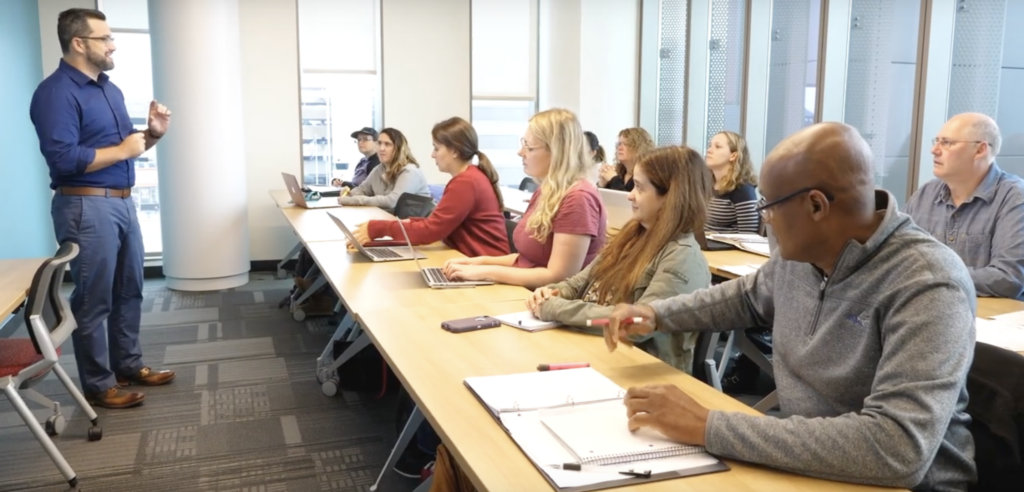Curriculum
The Residency Program will use Patricia Benner’s Novice to Expert Theory to guide the Nurse Practitioner Resident over the year long program. The program will focus on mentorship and continued learning as the Nurse Practitioner Resident gains knowledge and confidence to manage chronic diseases.
The Residency Program will utilize a competency-based comprehensive education and training system designed specifically to transition newly graduated Nurse Practitioners to safe, competent, and professional practitioners. Competency-based education provides a highly integrated and systematic approach to transitioning new graduate nurses by:
-
- Defining a comprehensive baseline set of measurements and outcomes, evidence-based structure, processes, and content.
- Integrating, teaching, monitoring, and managing adherence to those standards.
- Objectively evaluating success in achieving the Residency goals
Program Schedule:
- Four days patient facing hours per week at CompleteCare Health Network the second largest Federally Qualified Health Center (FQHC) in New Jersey, in their Cumberland County offices.
- Specialty Rotations in:
- Pediatrics
- Women’s Health

- Behavioral/Mental Health
- Medication Assisted Therapy (MAT)
- HIV/Hepatitis C

- Once weekly didactic learning
- Specialty Rotations in:
- Dedicated simulation experiences in behavioral/mental health and women’s health scenarios
- Monthly Career Coaching and Mindfulness & Resiliency Retreats
Didactic Learning Topics:
Quarter 1:
- Focused history, interviewing, and documenting
- Selecting, ordering, and interpreting laboratory tests
- Stages of change: self-management in primary car setting
- Billing and Coding
- Pediatric growth and development (newborns to early adolescence): screening, assessment, identification, and referral
- Immunizations of children and adults, typical and atypical
- Hypertension in Primary Care: assessment, diagnosis, management, and patient education
- Chronic Heart Failure: assessment, diagnosis, management, and patient education
- EKG Interpretation
- Medication Assisted Therapy (MAT): assessment and management of the opioid crisis.
- Diabetic Care: assessment, diagnosis, management, and patient education
Quarter 2 :
- Antibiotics
- Anxiety and Depression: screening, assessment, diagnosis, management, and patient education
- ADHD: screening, detection, assessment, treatment, patient/family education
- Pediatric growth and development (adolescence to adulthood): screening, assessment, identification, and referral
- Pediatric Asthma: assessment, diagnosis, management, and patient/family education
- Adult Asthma: assessment, diagnosis, management, patient education
- Managing neonatal jaundice and elevated bilirubin
- Chronic Kidney Failure: assessment diagnosis, management, and patient education
- Pre-Op Physicals
- Orthopedics: Upper and lower extremities and back: assessment, diagnosis, management, and patient education
- Managing Pain: pharmacologic and non-pharmacologic approaches
Quarter 3 :
- Spanish for Healthcare Professionals
- Contraception: methods intrauterine devices: selection, insertion, counseling
- Pap Smears: conducting and managing abnormal results.
- Sexually transmitted disease: conducting and managing patients
- Managing menopause: assessment, management, counseling, education
- Caring for patients with a history of trauma (physical, sexual, emotional)
- HIV/AIDS – overview, prevention, screening, testing, pharmacologic management in primary care
- Chronic Liver Failure: assessment, diagnosis, management, and patient education
- Lipid Management
- Hepatitis C: screening, assessment, management, patient education
- Thyroid disorders
- Nutritional Deficiencies
- Tobacco Cessation: evidence-based interventions including motivational interviewing
Quarter 4 :
- Spanish for Healthcare Professionals
- Oral Health: prevention, assessment, management, treatment of oral health problems
- Geriatrics: assessment and management of common geriatric concerns
- Podiatry: examination and assessment of the foot and common podiatric problems
- Skin lesions and rashes
- Suturing
- Wound, Continent and Ostomy Care
- Being on-call: assessment and management after hour